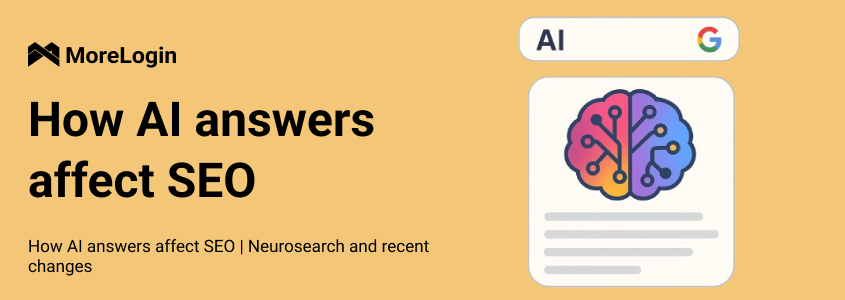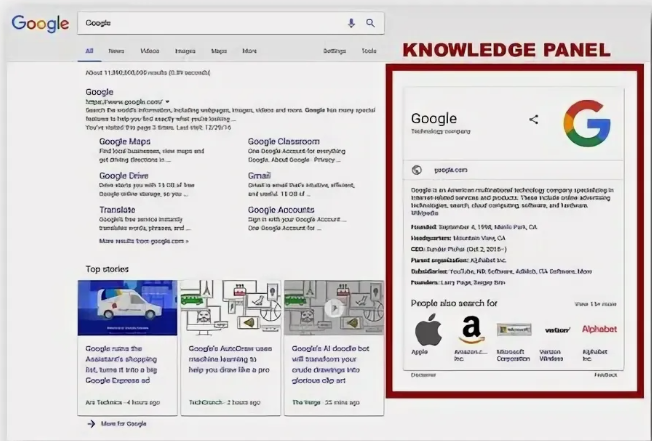
- Product

- Pricing
- Affiliate Program
- Use Cases
- Resource


The rise of AI didn’t mark the beginning of the search revolution — changes started long before. As early as the mid-2010s, search engines began replacing organic results with so-called Featured Snippets. Later came Knowledge Panels, People Also Ask, maps, videos, and news blocks, all pushing traditional blue links further down the first page.

In parallel, algorithms advanced to understand user intent — not just keywords. Google introduced BERT in 2019, followed by MUM in 2021, allowing search engines to grasp the meaning and context behind queries. This paved the way for generative search, where users receive AI-generated answers synthesized from multiple sources instead of just a list of links.
Today, this shift is evident in tools like Google’s Search Generative Experience (SGE) and Microsoft Copilot (formerly Bing Chat). In some regions, AI-generated answer blocks are being tested directly within the main search results, often appearing at the very top of the page.
Estimates from Similarweb, SparkToro, and Semrush suggest that 58–65% of search sessions now end without a click. This trend is especially true for informational queries like "What is cryptocurrency?", "Weather in Moscow", or "How to boil an egg." The user gets a full answer on the search results page, removing the need to visit a website.
This shift negatively impacts sites that focus on broad, general, or encyclopedic content. Visibility and CTR (click-through rate) are dropping for websites offering basic how-tos, lists, and generic articles.
In contrast, niche and expert-driven content continues to thrive. Algorithms now prioritize content that is unique, credible, and useful. Pages featuring first-hand experiences, professional analysis, case studies, and non-public insights are not only more likely to rank highly but are also selected for AI answer blocks.
Technical SEO factors like structure, keyword density, and subheadings are becoming less influential. Algorithms increasingly prioritize authentic, experience-rich content — content with personal perspective, case studies, and real opinions.
As a result, platforms such as forums, discussions, tech blogs, and specialized communities (e.g., Reddit, Quora, Stack Overflow, Habr) are ranking higher — because they represent real people and practical knowledge.
The game has changed: it’s no longer about optimizing for algorithms — it’s about creating content for real users. To compete in the AI-driven SEO landscape, content must be relevant and genuinely useful, grounded in real-world experience. Shallow or templated articles are losing ground to deep, insightful, and expert-driven content.
According to Ahrefs, 76% of pages featured in AI-generated answers also rank in the top 10 organic results. This confirms that SEO still works, but the key metrics have shifted. While traffic remains important, visibility now depends more on citations, reputation, and link ecosystem participation.
If your content is cited, mentioned, and shared across the web, your chances of appearing in AI answer blocks significantly improve. The semantic quality of your page matters, but so does the authority of your domain and author.
Modern algorithms also pay close attention to external signals — from forums and social media to niche communities. Not only do they track who mentions your content, but also how, where, and why it's being mentioned. Simply building backlinks is no longer enough — what matters now is genuine engagement and interaction.
To test SEO scenarios and analyze algorithm behavior, many SEO teams now use tools like MoreLogin, an anti-detect browser. It helps simulate different user behaviors, monitor changes in search results, and run A/B tests in personalized search environments — all without skewing data with cached sessions.
The goal is no longer just to rank for a keyword — it's to build a sustainable, trusted online presence. SEO today is about visibility, reputation, and relevance in your niche.
To survive and thrive in this new environment, content creators need to shift their strategy. Generic and surface-level content no longer delivers results. What’s needed is deep, original, and personal content.
Prioritize expert authors: Algorithms evaluate author bios and experience.
Build link reputation: Mentions and citations are more effective than direct optimization.
Write for people, not bots: AI can detect fake expertise.
Experiment with new content formats: Forums, case studies, and discussions are increasingly indexed.
Develop expert profiles: Platforms now rank individual authors, not just domains.
Avoid templated content: Mass-produced content without originality is filtered as noise.
Engage in niche communities: Public discussions, breakdowns, and collaboration build trust and visibility.
Over 60% of search sessions now end with no click, especially for general knowledge queries — a trend reinforced by AI answer blocks.
Modern models like Google MUM, Bing Deep Search, and OpenAI Answers evaluate context, credibility, and depth, making traditional SEO tactics like keyword stuffing and meta-tag manipulation obsolete.
Search engines now prioritize trusted sites with consistent mentions, expert authorship, and reputable domains. Mass content production without personality no longer works.
AI models can distinguish between repackaged content and original insights. That’s why real examples, data, comparisons, and critical analysis are key to ranking in modern search.
While traditional optimization — headlines, keywords, formatting — is still useful, it’s no longer enough without true expertise and originality.
AI isn’t killing SEO — it’s transforming it. The sooner this evolution is embraced, the better the chances of staying visible in the search results of tomorrow.